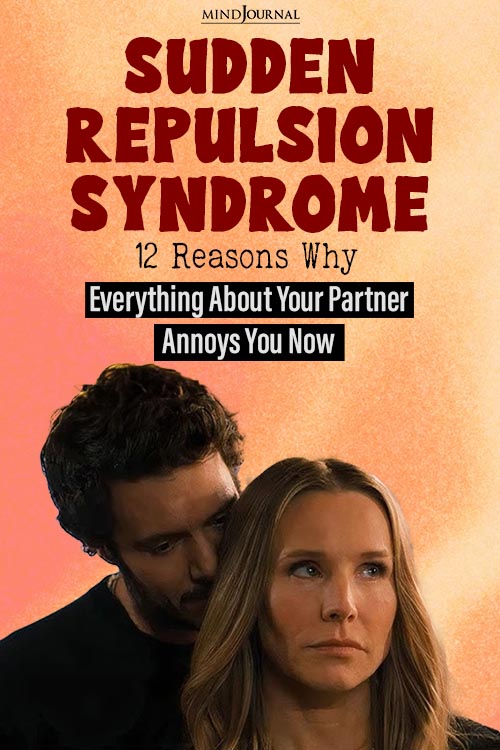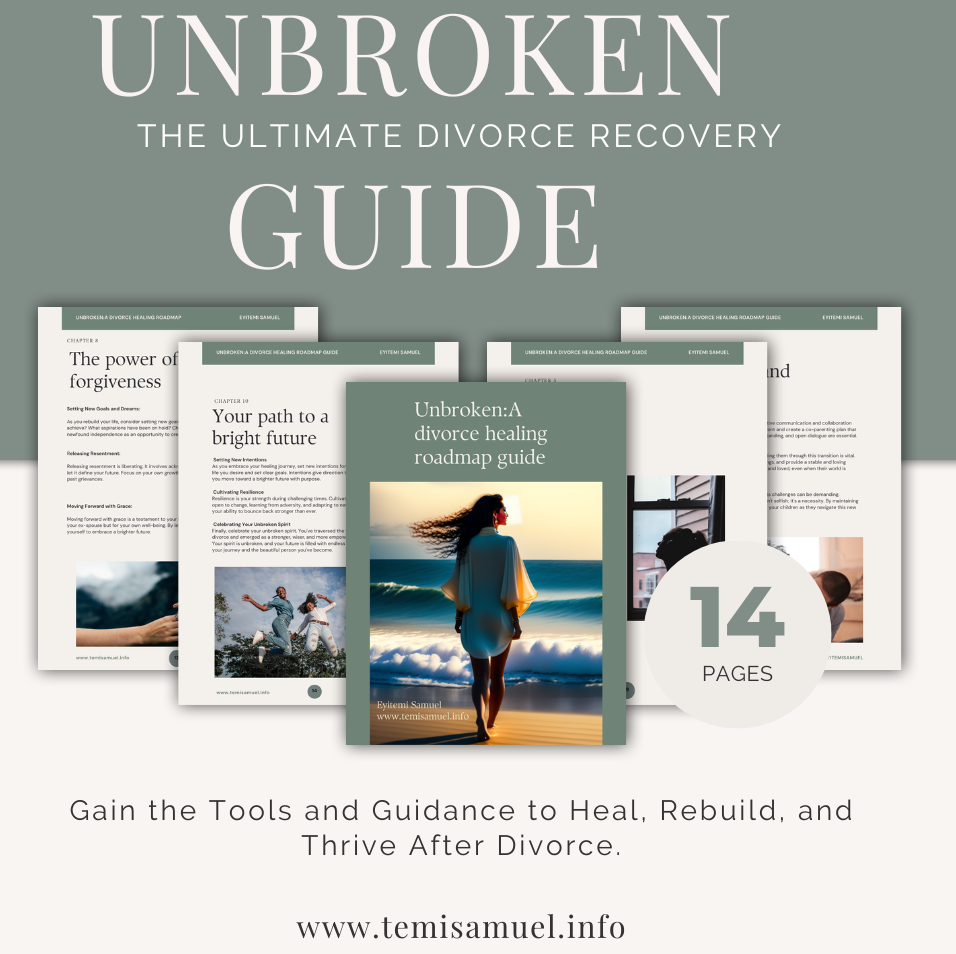Ever looked at your partner and, out of nowhere, felt the ick? The way they chew, the way they breathe, even the way they exist near you suddenly feels unbearable. If this sounds familiar, you might be experiencing Sudden Repulsion Syndrome (SRS). Here’s a breakdown of what it might mean in your relationship!
This strange phenomenon can strike out of nowhere, especially in long-term relationships or marriage. One day, everything feels normal, and the next, you can’t stand being around your partner. But why does this happen? More importantly, how do you overcome it?
What Is Sudden Repulsion Syndrome In Marriage or Long-term Relationships?

Sudden Repulsion Syndrome in marriage refers to an abrupt, intense feeling of disgust or irritation toward one’s partner. It often happens without warning and can leave people confused, questioning their love, relationship, and even considering breaking up.
Some Of The Common Sudden Repulsion Syndrome Symptoms
This condition doesn’t come with a formal diagnosis, but people who experience it often report the following sudden repulsion syndrome symptoms:
- Feeling physically repulsed by their partner’s habits (e.g., chewing, breathing, talking)
- A sudden loss of attraction or affection
- Feeling irritated by things that never used to bother them
- Wanting more space or even avoiding physical contact
- An overwhelming sense of discomfort when around their partner
Sudden Repulsion Syndrome Causes: Why Does It Happen?
SRS isn’t random, There are often psychological or emotional triggers behind it. Here are a few reasons why you might be feeling this way:
1. The Quirks You Loved Now Drive You Crazy
That cute little hum while they cook? The way they click their pen when thinking? Adorable at first, but now it grates on your nerves like nails on a chalkboard. It’s not you being petty, it’s just your brain tuning out the novelty and filing those sounds under “annoying background noise.”
2. Their Scent Doesn’t Hit the Same
Remember when their smell made you weak in the knees? That wasn’t just romance, it was biology at work. Over time, your brain stops registering familiar scents, making that once-intoxicating aroma fade into the ordinary. It’s not that they smell bad, you’re just desensitized.
3. Sleep Schedules Start a Silent War
You’re a night owl; they’re a morning person. At first, it was cute, but now it’s just exhausting. Their alarm blaring at dawn or their bedside lamp flicking on when you’re winding down? It’s messing with your rest and, by extension, your patience. Sleep deprivation isn’t just annoying, it literally changes how you feel about them.
4. Their Insecurities Start Feeling Like a Weight
You loved being their rock, the one who reassured them. But when the same fears and doubts keep resurfacing, your emotional battery starts running on empty. Your brain goes from “let me help” to “not this again”, not because you don’t care, but because constant reassurance is draining.
5. Their Jokes Aren’t Funny Anymore
The first time they told that embarrassing college story, you laughed. The tenth time, you forced a smile. The hundredth? You’re bracing yourself before they even start. Your brain craves novelty, and repeated jokes don’t deliver the same dopamine rush—they just trigger irritation.
6. Broken Promises Chip Away at Trust
They say they’ll wash the dishes, but they don’t. They promise to be on time, but they’re late, again. At first, you brushed it off. But your brain is keeping score, and every small letdown adds up. Without even realizing it, you start flinching at their commitments, expecting disappointment instead of follow-through.
7. Hormonal Changes Shift Your Attraction
Attraction isn’t just emotional, it’s also chemical. Big life changes like going off birth control, pregnancy, or aging can literally alter who and what you find attractive. If your feelings seem to shift out of nowhere, your body might just be running a new compatibility test.
8. Predictability Kills the Spark
In the beginning, every story, reaction, and habit was fascinating. Now, you can finish their sentences before they do. Predictability makes your brain tune out, what once felt exciting now feels like background noise. It’s not boredom; it’s just how your brain operates.
9. Stress Conditions You to Associate Them With Negativity
If you’ve been through constant stress together, money struggles, family drama, health scares, then your brain starts linking their presence to those bad times. Even when things are fine, your body reacts as if it’s bracing for the next storm.
10. Old Wounds Reopen Themselves
Even if you’ve “moved on” from past arguments, your subconscious remembers. A tiny comment or action can trigger buried frustrations, making past hurts feel fresh all over again. It’s your brain on autopilot, reacting before you even realize why.
11. Their Phone Scrolling Feels Like Rejection
You’re talking, and they’re half-listening, eyes glued to their phone. It’s small, but it stings. Your brain registers it as social rejection, making you feel unimportant, unseen, and resentful. Over time, this disconnect builds a quiet wall between you.
12. Unspoken Anger Shows Up as Disgust
When resentment festers, your body reacts before your mind catches up. You flinch at their touch, roll your eyes, or feel irritated by their presence. It’s not that you suddenly find them repulsive, it’s unaddressed frustration bubbling to the surface.
How to Overcome Sudden Repulsion Syndrome
SRS doesn’t have to mean the end of your relationship. Here’s how to overcome sudden repulsion syndrome and work through it:
1. Identify the Root Cause
Ask yourself: What exactly is triggering this feeling? Is it something recent, or has it been building over time? Understanding the cause is the first step to fixing it.
2. Communicate Openly
If something your partner does is bothering you, talk about it. Honest conversations (without blame) can help clear misunderstandings and strengthen your bond.
3. Reignite the Spark
Feeling repulsed often comes from emotional distance. Try new experiences together, plan date nights, or revisit the early days of your relationship to rekindle connection.
4. Focus on Self-Care
Sometimes, irritation toward your partner is a reflection of personal stress. Make sure you’re prioritizing your own mental and physical well-being.
5. Seek Professional Help if Needed
If your feelings of repulsion persist and are damaging your relationship, couples therapy or personal counseling can help unpack deeper emotional triggers.
Related: Partner Giving You The Ick In A Long Term Relationship? 5 Things To Do When Sparks (Don’t) Fly
Is SRS a Relationship Ender?
Sudden Repulsion Syndrome can feel overwhelming, but it’s not always a sign that your relationship is doomed. Often, it’s a temporary reaction to stress, emotional distance, or deeper unresolved issues. The key is recognizing it early and taking steps to address it.
So, if you’ve ever felt this way, don’t panic! With self-awareness, communication, and effort, you can move past SRS and rediscover the love that brought you together in the first place.
Frequently Asked Questions (FAQs)
What causes sudden repulsion syndrome?
Repulsion towards another person is masked underlying anger or resentment. Instead of being angry or resentful, we might react with annoyance or recoil from their touch.
How to overcome sudden repulsion syndrome?
If you are experiencing the symptoms of Sudden Repulsion Syndrome, then discuss your issues with your partner. Have an honest conversation about your feelings.
What is sudden repulsion syndrome?
Sudden Repulsion Syndrome in marriage refers to an abrupt, intense feeling of disgust or irritation toward one’s partner.



